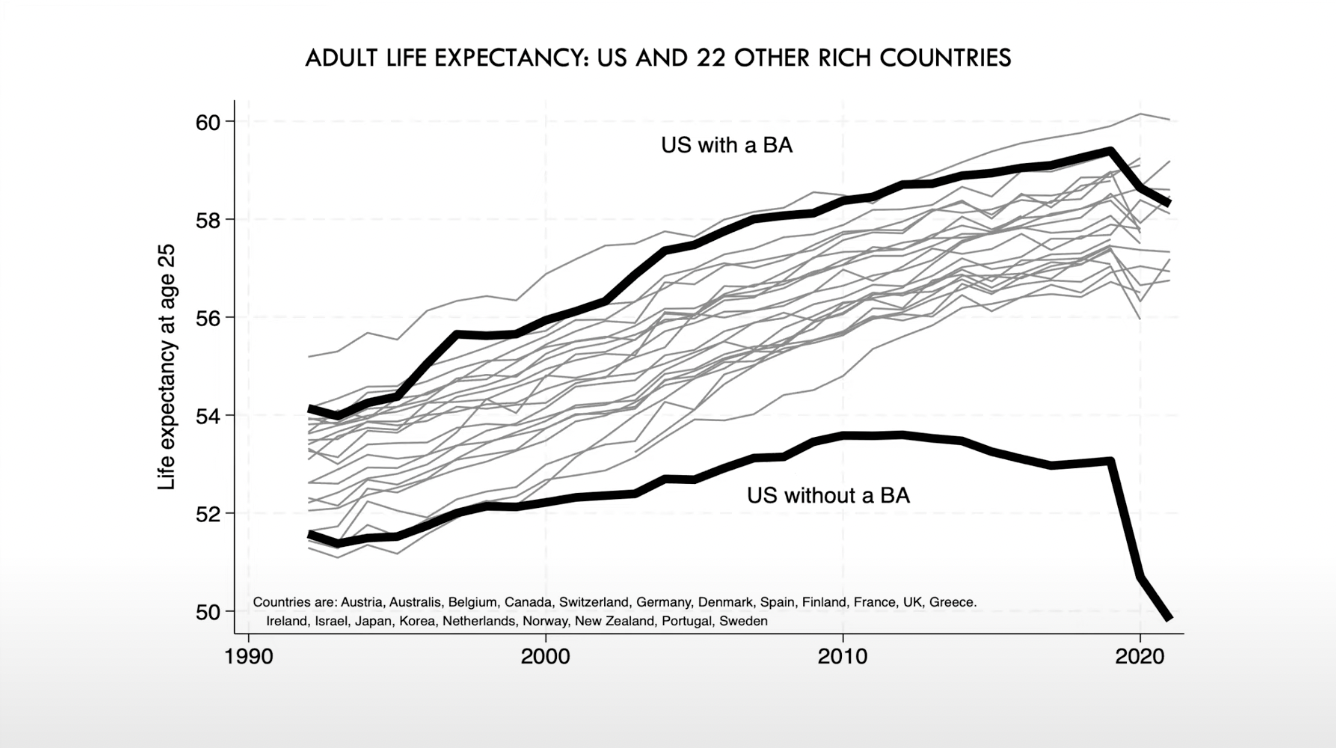NEW PARADIGM
Discussion of Economics in America with Angus Deaton: The Boundaries of Efficiency
Many people today have lost faith in capitalism, as well as any faith or trust in economists, who are seen as its apologists. Did economics take a wrong turn? We discussed this at our last Short Cut with Nobel laureate Angus Deaton and RWI-President Christoph M. Schmidt.
BY
DAVID KLÄFFLINGPUBLISHED
23. FEBRUARY 2024READING TIME
5 MIN
For most economists today, the notion that economics is mostly concerned with the efficient allocation of resources through markets and prices is the dominant description. In his introductory talk on his book ‘Economics in America: An Immigrant Economist Explores the Land of Inequality’, Angus Deaton pointed out two shortcomings of this efficiency-confined view of free-market economics and economists.
One example of where the old paradigm of free-market economics got it wrong was the minimum wage. In their famous design-based research paper on employment effects of minimum wages, David Card and Alan Krueger showed that a minimum wage introduction does not need to have negative employment effects, as predicted by the basic textbook model. One explanation involves the presence of monopsonies, and wages being determined by a distribution conflict rather than the marginal product of labor. According to Deaton, economists who strongly oppose minimum wages are a good example of the profession’s shortcomings, by laying too much emphasis on efficiency (by market solutions) and ex-post redistribution without considering ex-ante predistribution.
The second flaw according to Deaton revolves around free trade and global poverty reduction. The basic idea that free trade as an engine of prosperity is in the national interest seems to be confirmed by the large-scale and unprecedented poverty reduction around the world in the last decades. Even if some people in rich countries were hurt, the utilitarian and, more importantly, cosmopolitan-prioritarian argument is that they are still much better off than the global poor exiting poverty, for example in China.
Deaton put forward several arguments against these pro-free-trade arguments. First, even if the free-trade gains within a country are much higher than the losses, these are very unevenly distributed, and the hypothetically possible compensation rarely gets paid. This is further exacerbated by adjustment and transaction costs (e.g., to move to a more productive city) and low mobility. Second, cosmopolitanism seems to be ethically contestable, as fellow citizens share with each other but not with foreigners both common tax and insurance schemes as well as military, legal, and political systems. Third, possibly with the gravest consequences, there are potentially high political costs (populism), since fellow citizens can vote, which foreigners cannot. More concretely, Deaton argued that a governing elite, prioritizing efficiency in economic policy decisions that harmed the American working class without the promised compensation but with a condescending attitude to opponents of these policies, can help to explain Trump’s success.
“In a democracy, ignoring the wishes of two-thirds of the population is a pretty stupid thing to do. And, even if we [economists] were right, you do not have to take an economics exam in order to be allowed to vote. And the trouble is, I am not sure that we were always right.”

According to Deaton, the failure of US-American society can be summed up in the numbers for life expectancy for men and women without a four-year college degree (representing two-thirds of the population), which has stopped rising after 2010. Deaton offered three possible channels by which economic policy might have played a role in this development. Next to its trade policy (China shock), he called out a higher political and legal relevance of business interests, which together with a decline in unionization and good jobs has lowered the power of workers.
But what should economics be about then, if not (only) about efficiency? To answer this question, Deaton ended his talk with three quotes by three very different economists and their understanding of the profession.
“Nobody can be a great economist who is only an economist - and I am even tempted to add that the economist who is only an economist is likely to become a nuisance if not a positive danger.”
“It is not wonder, but rather the social enthusiasm which revolts from the sordidness of mean streets and the joylessness of withered lives, that is the beginning of economic science.”
"The political problem of mankind is to combine three things: economic efficiency, social justice, and individual liberty."
Christoph M. Schmidt, who was living in the United States as a PhD student of Angus Deaton at Princeton between 1987-1991, said in his comments that he shared with Deaton the feeling of ambivalence towards US-American society. On the one hand, high respect for the tremendous economic, academic, and cultural achievements, and on the other hand, a difficult time to understand the large tolerance for extreme inequality and abject poverty.
Comparing the US situation to the German one, Schmidt argued that even though (income) inequality is less of a problem due to a well-functioning welfare state, the two countries share the problem of rising populism.
“We have similar problems with some groups of society – Angus was talking about pitchforks, which resonates with our latest experiences on the streets. Not respecting the needs and preferences of all people in societies is coming back at you at some point.”
What is very different in Germany, according to Schmidt, is that the Economics profession does not play such an important role in the political decision-making process, nor in the public debate. Deaton and Schmidt disagreed on how to solve the efficiency-equity trade-off. While Christoph Schmidt found that in the German debate around climate policies and carbon pricing there was too little emphasis on efficiency, Angus Deaton argued in favor of Biden-type policies (green incentives through conditional subsidies).
The discussion highlighted that economic efficiency is not only bounded directly by a society’s concerns for equity (redistribution by the welfare state) but is also indirectly constrained through the political system, with populist parties taking advantage of the negative (distributional) effects of efficiency-centered economic policies.
